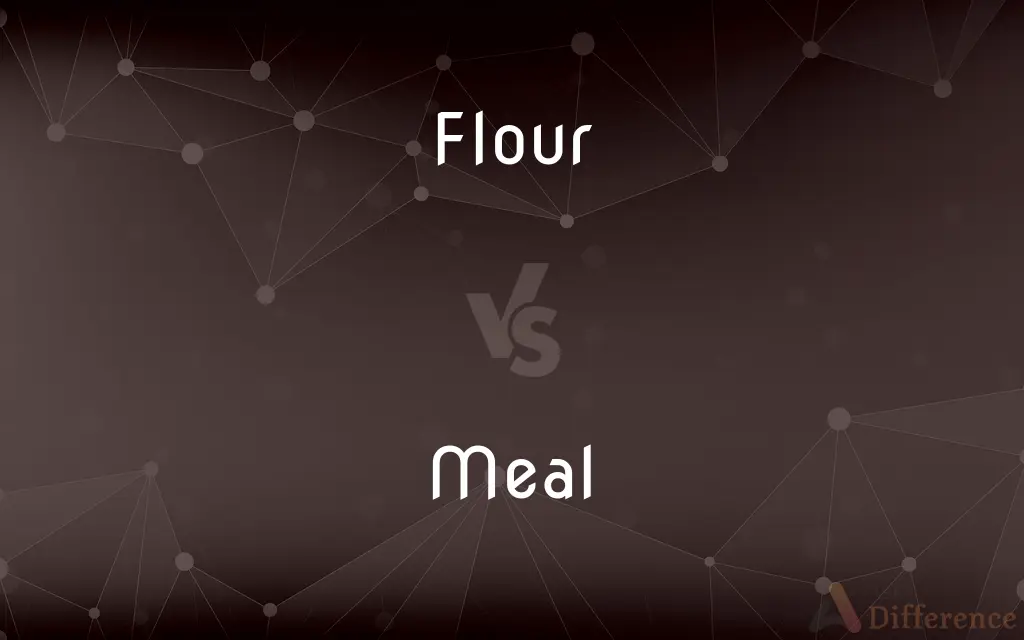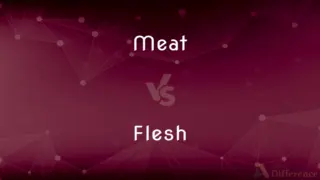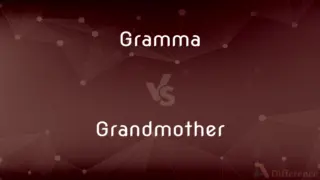Flour vs. Meal — What's the Difference?
By Tayyaba Rehman — Updated on October 26, 2023
Flour is a fine powder made by grinding grains or other foods, while meal refers to coarser ground grains or a particular time for food consumption.

Difference Between Flour and Meal
Table of Contents
ADVERTISEMENT
Key Differences
"Flour" typically denotes a finely-ground powder, often derived from grains, used primarily in baking and cooking. Commonly, when one thinks of flour, wheat flour comes to mind, used in a variety of recipes, from bread to pastries. "Meal," on the other hand, can refer to a coarser ground grain or seed, such as cornmeal. This distinction in granularity between "Flour" and "Meal" often affects the texture and consistency of the final product.
In some contexts, "Flour" can be derived from sources other than grains. For instance, almond flour, made from finely ground almonds, is popular in gluten-free cooking. "Meal" in its granular context can also come from diverse sources, such as flax meal from flax seeds. This demonstrates that both "Flour" and "Meal" can be derived from various raw materials, but the degree of fineness typically differentiates them.
Additionally, "Meal" has another distinct meaning, referring to an occasion when food is consumed, like breakfast or dinner. In this context, "Meal" has no direct relation to "Flour." When someone says they're preparing a meal, they're usually talking about cooking or putting together food to eat. "Flour," in contrast, doesn't possess this dual meaning and primarily remains a culinary ingredient.
While both "Flour" and "Meal" play pivotal roles in gastronomy, their functions can differ. For instance, the fine consistency of flour makes it apt for making smooth batters or doughs. In comparison, the grainy nature of "Meal" lends itself well to dishes requiring a more textured profile, like cornbread or polenta.
Comparison Chart
Texture
Fine powder.
Coarser granules.
ADVERTISEMENT
Primary Use
Baking and cooking for smooth batters and doughs.
Recipes requiring a textured profile or an occasion for food consumption.
Common Source
Grains like wheat, oats.
Grains like corn or times like breakfast, lunch.
Alternative Uses
Can be made from non-grains like almonds.
Can refer to coarser ground seeds like flax.
Dual Meaning
Primarily a culinary ingredient.
Can refer to coarser ground grains or a food consumption occasion.
Compare with Definitions
Flour
A ground substance used as a thickener in some dishes.
The sauce was thickened with some rice flour.
Meal
A specific time dedicated to eating.
Dinner is my favorite meal of the day.
Flour
A main ingredient in baking.
Flour is essential for making cakes and cookies.
Meal
The edible part of grain or pulse ground to a coarse powder.
The mill produced both flour and meal from the same grains.
Flour
A base for many culinary dishes.
She sifted the flour before adding it to the mixture.
Meal
A main course of a food intake event.
The steak was the centerpiece of the meal.
Flour
Flour is a powder made by grinding raw grains, roots, beans, nuts, or seeds. Flours are used to make many different foods.
Meal
Coarsely ground grains or seeds.
Cornmeal is used to make cornbread.
Flour
A powder obtained by grinding grain, typically wheat, and used to make bread, cakes, and pastry.
Meal
An occasion when food is consumed.
We had a lovely meal at the restaurant last night.
Flour
Sprinkle (something, especially a work surface or cooking utensil) with a thin layer of flour.
Meal
A meal is an eating occasion that takes place at a certain time and includes prepared food. The names used for specific meals in English vary, depending on the speaker's culture, the time of day, or the size of the meal.
Flour
Grind (grain) into flour.
Meal
The edible whole or coarsely ground grains of a cereal grass.
Flour
A fine, powdery foodstuff obtained by grinding and sifting the meal of a grain, especially wheat, used chiefly in baking.
Meal
A granular substance produced by grinding.
Flour
Any of various similar finely ground or powdered foodstuffs, as of cassava, chickpeas, or bananas.
Meal
The food served and eaten in one sitting.
Flour
A soft, fine powder.
Meal
A customary time or occasion of eating food.
Flour
To cover or coat with flour.
Meal
Correct quotes
Flour
To make into flour.
Meal
Move Middle English to an Middle English (enm) entry
Flour
Powder obtained by grinding or milling cereal grains, especially wheat, or other foodstuffs such as soybeans and potatoes, and used to bake bread, cakes, and pastry.
Meal
Possible search real New English citations for obsolete senses}}
Flour
The food made by grinding and bolting cleaned wheat (not durum or red durum) until it meets specified levels of fineness, dryness, and freedom from bran and germ, also containing any of certain enzymes, ascorbic acid, and certain bleaching agents.
Meal
(countable) Food that is prepared and eaten, usually at a specific time, and usually in a comparatively large quantity (as opposed to a snack).
Breakfast is the morning meal, lunch is the noon meal, and dinner, or supper, is the evening meal.
Flour
Powder of other material.
Wood flour, produced by sanding wood
Mustard flour
Meal
(countable) Food served or eaten as a repast.
Flour
Obsolete form of flower
Meal
A break taken by a police officer in order to eat.
Flour
(transitive) To apply flour to something; to cover with flour.
Meal
(obsolete) A time or an occasion.
Flour
(transitive) To reduce to flour.
Meal
The coarse-ground edible part of various grains often used to feed animals; flour or a coarser blend than flour.
Flour
(intransitive) To break up into fine globules of mercury in the amalgamation process.
Meal
A speck or spot.
Flour
The finely ground meal of wheat, or of any other grain; especially, the finer part of meal separated by bolting; hence, the fine and soft powder of any substance; as, flour of emery; flour of mustard.
Meal
A part; a fragment; a portion.
Flour
To grind and bolt; to convert into flour; as, to flour wheat.
Meal
To yield or be plentiful in meal.
Flour
To sprinkle with flour.
Meal
(transitive) To defile or taint.
Flour
Fine powdery foodstuff obtained by grinding and sifting the meal of a cereal grain
Meal
A part; a fragment; a portion.
Flour
Cover with flour;
Flour fish or meat before frying it
Meal
The portion of food taken at a particular time for the satisfaction of appetite; the quantity usually taken at one time with the purpose of satisfying hunger; a repast; the act or time of eating a meal; as, the traveler has not eaten a good meal for a week; there was silence during the meal.
What strange fishHath made his meal on thee?
Flour
Convert grain into flour
Meal
Grain (esp. maize, rye, or oats) that is coarsely ground and unbolted; also, a kind of flour made from beans, pease, etc.; sometimes, any flour, esp. if coarse.
Flour
A fine powder made from ground grains.
Wheat flour is commonly used in baking bread.
Meal
Any substance that is coarsely pulverized like meal, but not granulated.
Flour
A primary agent in bread production.
Without flour, making traditional bread would be impossible.
Meal
To sprinkle with, or as with, meal.
Meal
To pulverize; as, mealed powder.
Meal
The food served and eaten at one time
Meal
Any of the occasions for eating food that occur by custom or habit at more or less fixed times
Meal
Coarsely ground foodstuff; especially seeds of various cereal grasses or pulse
Common Curiosities
Why is flour used in baking?
Flour provides structure and texture to baked goods and helps in the binding of ingredients.
Can flour be eaten raw?
Eating raw flour isn't recommended due to potential contaminants; it's best cooked.
Can meal refer to something other than food times?
Yes, "meal" can refer to coarsely ground grains or seeds, like cornmeal.
Is cornmeal a type of flour?
While both are ground from corn, cornmeal is coarser than corn flour.
What’s the difference between a snack and a meal?
A meal is often more substantial and may be more balanced, while a snack is typically smaller and lighter.
Is flour always made from wheat?
No, flour can be made from various grains, seeds, or nuts, like almonds or oats.
Are all meals the same across cultures?
No, meal customs, like times and dishes, vary across cultures.
How is bread flour different from all-purpose flour?
Bread flour has a higher protein content, making it ideal for yeasted bread.
Can you substitute one type of flour for another in recipes?
It depends on the recipe, but substitutions may affect the dish's texture and flavor.
Why is flour sometimes sifted before use?
Sifting flour aerates it, breaks up clumps, and results in lighter baked goods.
Is mealtime important?
Yes, regular mealtimes help structure the day and can have nutritional and social benefits.
Is "meal" always related to food?
Primarily yes, either as an eating occasion or as a coarser ground food product.
Is almond flour gluten-free?
Yes, almond flour is naturally gluten-free and often used in gluten-free recipes.
Can "meal" refer to the quality of a grind?
Yes, it can indicate a coarser grind compared to flour.
Are breakfast, lunch, and dinner the only meals?
No, there are other meals like brunch, tea, or supper, varying by culture and tradition.
Share Your Discovery

Previous Comparison
Meat vs. Flesh
Next Comparison
Gramma vs. GrandmotherAuthor Spotlight
Written by
Tayyaba RehmanTayyaba Rehman is a distinguished writer, currently serving as a primary contributor to askdifference.com. As a researcher in semantics and etymology, Tayyaba's passion for the complexity of languages and their distinctions has found a perfect home on the platform. Tayyaba delves into the intricacies of language, distinguishing between commonly confused words and phrases, thereby providing clarity for readers worldwide.















































